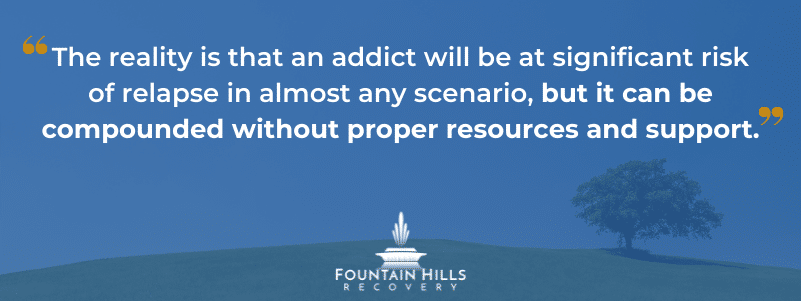Watching a family member or loved one suffer from drug addiction is heartbreaking and watching them relapse when pursuing recovery may seem hopeless. We want our loved ones to have the best chance at health, happiness, and long-term success – but how do we help them?
In this guide, we’ll cover:
- How to help someone with a drug addiction
- Why do addicts relapse?
- When is relapse most likely to occur?
- How to help prevent substance abuse relapse
- How to get professional help for drug addiction
How to Help Someone with a Drug Addiction
When someone you care about is addicted to drugs or alcohol, it can be difficult to get them the help they need. This is especially true because the actions of an addict impact more than themselves, and your life may be intertwined with the consequences of their addiction.
This means that immediately getting the proper help is crucial for them, you, and anyone else affected by the addiction.
Here are some actions to take when helping someone through drug addiction:
- Do not enable them financially or by doing drugs with them.
- Educate yourself about addiction and recovery.
- Make sure their addiction is not harming you.
- Do not shame, blame, or berate an addict.
- Understand that recovery is a long-term process.
- Help get them into appropriate rehabilitation programs.
- Stay consistent with your messaging and actions.
Regardless of how much you want to see your loved one recover, they must want recovery themselves. Still, they need the help of their friends, family, and a support system. Using half-measures or improper channels to help can set them back, so working with professional guidance is highly recommended.

Why do Addicts Relapse?
Each person’s addiction, recovery path, and reasons for relapse differ. However, it is universally agreed that the rehabilitation journey is difficult, non-linear, and relapse is far from uncommon.
It is estimated that between 40-60% of addicts relapse at some point in their recovery.
Some reasons for relapse might include:
- A change in environment or living situation
- Mental health or secondary disorder reactions
- Isolation or boredom
- Financial stress
- Work stress
- Withdrawal symptoms
These are just some of the many reasons that an addict might relapse. No reason is better or worse than others, requiring immediate attention. Similarly, a relapse does not mean that treatment has failed; it means that the risk of a specific type or cause of relapse must be noted and added to their recovery plan.
When is Relapse Most Likely to Occur?
Given the chronic nature of substance abuse disorder, recovering addicts are at varying risks of relapse. Many relapses happen within the first week of trying to quit drugs or alcohol due to withdrawal symptoms. In addition to that, studies have shown that most relapses occur within the first 90 days of abstinence.
This short-term window of 90 days is a big reason that most ideal rehabilitation programs run 90-day rehabilitation programs. Building strong habits, recreating healthy support systems, and educating recovering addicts on ways they can diffuse and ward off future temptations to relapse is an integral part of helping them get control back over their lives.
Ultimately, the best thing we can do to help our loved ones during recovery is to be ready for any scenarios involving relapse.
How to Help Prevent Substance Abuse Relapse
There are plenty of ways to support your struggling loved one and prevent relapse, including:
- Acquiring proper professional guidance and rehabilitation resources
- Knowing and avoiding potential triggers in daily life
- Creating an emergency contact or support group list
- Attending meetings or rehabilitation mindfulness clinics
- Encouraging and joining in healthy habits and alternatives to drug use
- Communication about all aspects of life, including rehab and recovery
- Ensuring that evidence-based addiction treatment is available
The reality is that an addict will be at significant risk of relapse in almost any scenario, but it can be compounded without proper resources and support. Make sure to discuss specific ways to aid your loved one with them, their clinicians, and any relevant support groups.

How to Get Professional Help for Drug Addiction
There are plenty of effective options for receiving professional help for substance abuse or alcohol addiction.
Some of the most prevalent and successful programs include:
- 12-Step Rehabilitation Programs: The 12-step program works by providing insight into the negative effects of substance abuse so that the addict can learn and strengthen their skills over time.
- Addiction Counseling: Addiction counseling and psychotherapy are integral parts of many long-term recovery plans. Addiction specialists and counselors can help with interventions at the request of family members, or they can work to keep a patient safe and comfortable as they confront the different challenges of rehabilitation.
- Inpatient Rehabilitation Centers: Inpatient programs often focus on short-term stabilization, mental health treatment, and medical assistance. Patients live and receive treatment in these clinics seven days a week and receive highly personalized support.
- Outpatient Treatment Programs: Outpatient treatment is a great option for addicts who can continue their day-to-day and professional lives while they recover. The best outpatient treatments for addiction recovery are still very intensive and rely on trust and support systems.
These are just some of the many ways to get professional help for drug addiction. Whether you or a loved one is seeking treatment, it is vital to act now. Each day spent on the path to recovery is crucial for long-term success.
Fountain Hills Recovery is Arizona’s Leading Rehabilitation Clinic
At Fountain Hills Recovery, we recognize that addiction affects people from all walks of life. Not only does it affect the addict, but it affects their family and loved ones as well. We work to create unique treatment plans that include support systems to prevent relapse as much as possible.
Our experts have been serving the Arizona community for decades and would love to help you or your loved one get life back on track.
If you are interested in learning more about evidence-based addiction therapies, please reach out today.





